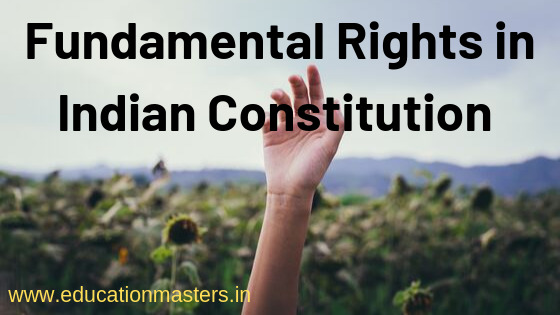Fundamental Rights in Indian Constitution
By Aditya pandey | General knowledge | Sep 30, 2019

In this article, we are explaining the fundamental rights of the Indian constitution. This topic comes in all types of law exams if you are preparing for any type of law exams you should study these facts about the Indian Constitution. constitution of India is the longest constitution of the world. To gain knowledge about the fundamental rights of the Indian Constitution you can refer this article to know more.
FUNDAMENTAL RIGHTS
(Articles 12 to 35)
General characteristics of fundamental rights: The Indian constitution guarantees essential human rights in the form of fundamental rights under part III and also the directive principle of state policy in part III which are fundamental in the governance of the country. Articles 12 to 35 of the constitution pertains to fundamental rights of the people.
These rights are reminiscent of the some of the provision of the bill of right in U.S.A. constitution.
The fundamental rights are a necessary consequences of declaration in the preamble to the constitution that the people of India solemnly resolved to constitute India into sovereign, democratic, republic, and to secure to all of its citizens, justice social, economic political and liberty of thoughts expression belief, faith and worship, equality of status and opportunity.
The key rights in the Indian constitution have been gathered under seven heads as pursues:-
- Right to equality (article 14- 18 )
- Right to freedom (article 19-22)
- Right against exploitation (23-24)
- Right to freedom of religion (25-28)
- Cultural and educational rights ( 29-30)
- Right to property which is diluted and secured to some extent by an article ( 30-A to 31-C)
- Right to constitutional remedies (32- 35 )
Right to equality:-
Article 14 speaks to the possibility of uniformity, which expresses that the state will not deny to any individual equity under the steady gaze of the law or the equivalent assurance of the laws inside the domain of India. The uniformity under the watchful eye of law is ensured to all regardless of race, shading, or nationality.
(Article 15): Non-separation on grounds of religion, race, rank, sex, or spot of birth:-
The Article 15 expresses that the state will not victimize any resident on grounds just of religion, standing, sex, the spot of the birth, or any of them and would not be dependent upon any handicap, risk, confinement, or condition. Nothing in this article will keep the state from making any uncommon arrangements for ladies and kids. Nothing in this article or sub-condition (G) of proviso (1) of Article 19 will keep the state from making any extraordinary arrangement by law, for the progression of any socially and instructively in reverse classes of residents or for the Scheduled Castes or Scheduled Tribes.
(Article 16): Equality of chance in openwork:-
Article 16 expresses that no resident will on grounds just of religion, race, rank, sex, plunge, the spot of the birth, living arrangement, or any of them, be ineligible for, or victimized in regard of any business or office under the state.
It engages Parliament to make a law recommending any necessity as to habitation inside that state or UT preceding work or arrangement in that state or UT. It engages the state to make unique arrangements for the booking of arrangements or posts for any regressive classes of residents.
(Article 17): Abolition of Untouchability:-
Article 17 nullifies Untouchability and restricts its training in any structure. Unapproachability alludes to a social practice which looks downward on certain mistreated classes exclusively by their introduction to the world and makes any victimization them on this ground.
(Article 18): Abolition of Titles:
Article 18 annuls all titles and disallows the state to present titles on anyone whether a native or a non-native. In any case, military and scholastic qualifications are excluded from the preclusion.
(Article 19): Right to Freedom :
The Right to Freedom certifications to the residents of India six Fundamental Freedoms: 1) Freedom of Speech and Expression, 2) Freedom of Assembly, 3) Freedom to shape affiliations, 4) Freedom of Movement, 5) Freedom to live and to settle and 6) Freedom of calling, occupation, exchange, or business.
(Article 20): Protection in regard of Conviction for Offenses:
Article 20 gives assurance against self-assertive and intemperate discipline to any individual who carries out an offence. This article has taken consideration to defend the privileges of people blamed for violations. Also, this article can't be suspended notwithstanding during crisis inactivity under Article 359.
सरकारी नौकरियों, जीके अपडेट्स और करेंट अफेयर्स की ताज़ा जानकारी सबसे पहले पाने के लिए:
-
हमारे WhatsApp चैनल को फॉलो करें:
https://whatsapp.com/channel/0029Vb6sjZz0wajwDXcd5B0U -
हमारे Telegram चैनल को फॉलो करें:
https://t.me/educationmastersin -
हमारे Facebook Page को फॉलो करें:
https://www.facebook.com/educationmastersindia
Share this Post
(इस पोस्ट को अपने दोस्तों के साथ शेयर करना ना भूले)Posts in Other Categories
Latest Posts
Top 10 Longest Rivers in the World | Length, Ori ...
Feb 05, 2026
JEE Main 2026 Session 1 Answer Key Out @ jeemain ...
Feb 04, 2026






.jpg)
.jpg)

